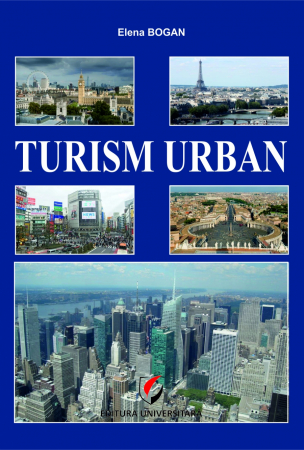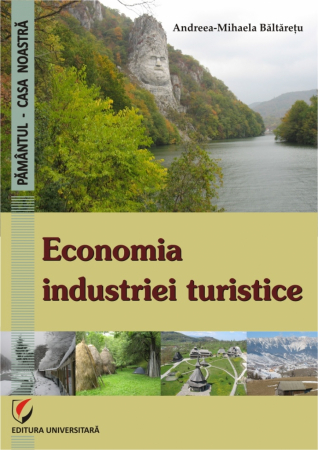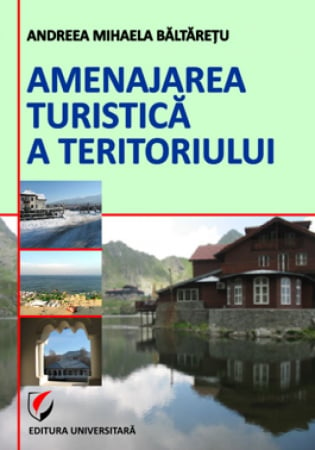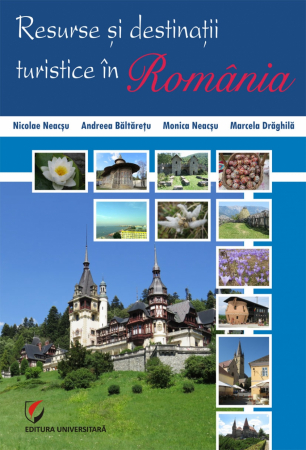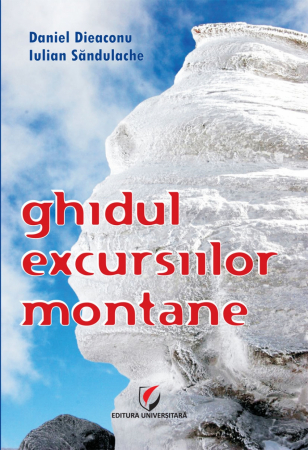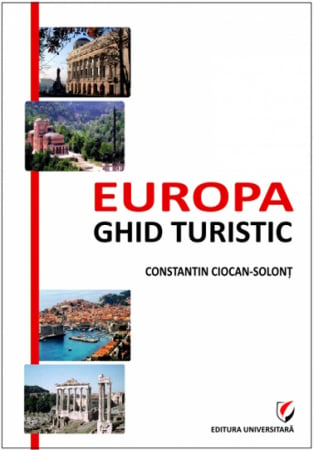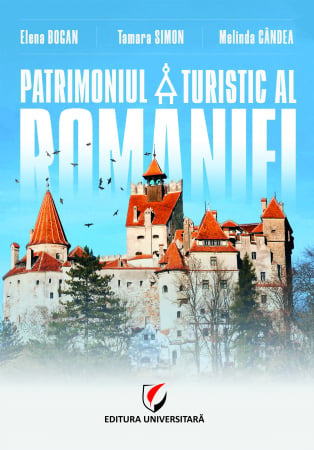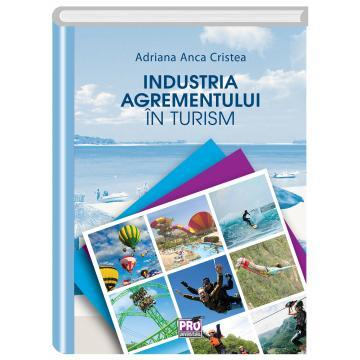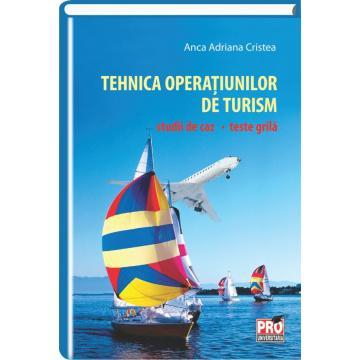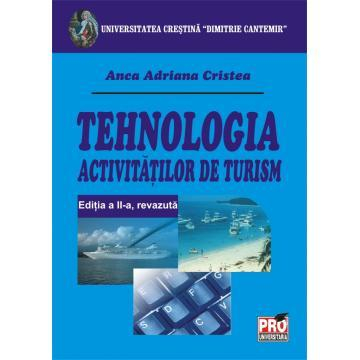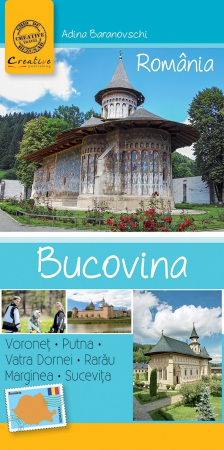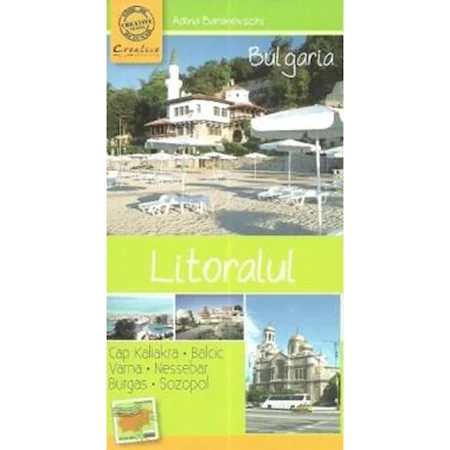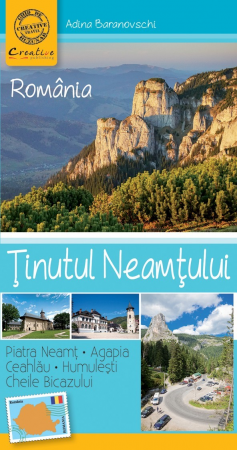Manuscript proposals: [email protected] / 0745 204 115 //// Tracking orders Individuals / Sales: 0745 200 357 / Orders Legal entities: 0721 722 783
ISBN: 978-606-28-0855-6
DOI: 10.5682/9786062808556
Publisher year: 2019
Edition: I
Pages: 266
Publisher: Editura Universitară
Author: Elena Bogan, Tamara Simon
Product Code:
9786062808556
Do you need help?
0745 200 357
- Description
- Download (1)
- Authors
- Content
- More details
- Reviews (0)
Rural tourism is, in fact, a possibility to capitalize on the rural space, which highlights specific resources, less known and promoted, without losing authenticity and cultural identity, typical architecture, without "hijacking" the agricultural destination of the land . Rural tourism and implicitly agrotourism can help to diversify and, therefore, to stabilize the local economy, to create business opportunities and, through them, to the emergence of new jobs, the promotion and development of services, the diversification of the use of labor force. work, attracting new investments.
In this context, this book, focused on the latest developments in rural tourism, with all its characteristics - worldwide, European and national, makes a modest contribution to highlighting all opportunities to capitalize on
the natural and cultural potential of the rural area with strong tourist values. By the way it expands, rural tourism demonstrates that it is becoming more and more a phenomenon with a major role in preserving the national popular specificity, and through its future evolution, rural tourism must become a pillar of support of all that means unity, authenticity and originality, which the authors of this book also wanted to support.
Rural tourism has the merit of highlighting the fact that everything that is invaluable in terms of wealth and values in the village world, needs to be valued more and passed on to future generations.
In this context, this book, focused on the latest developments in rural tourism, with all its characteristics - worldwide, European and national, makes a modest contribution to highlighting all opportunities to capitalize on
the natural and cultural potential of the rural area with strong tourist values. By the way it expands, rural tourism demonstrates that it is becoming more and more a phenomenon with a major role in preserving the national popular specificity, and through its future evolution, rural tourism must become a pillar of support of all that means unity, authenticity and originality, which the authors of this book also wanted to support.
Rural tourism has the merit of highlighting the fact that everything that is invaluable in terms of wealth and values in the village world, needs to be valued more and passed on to future generations.
-
Rural tourism
Download
ELENA BOGAN
TAMARA SIMON
TAMARA SIMON
Introduction / 7
Chapter I. The rural space - support of the tourist activity / 9
1.1. The concept of rural space and the structure of rural space / 9
1.2. The essential functions of rural tourism / 15
1.3. Forms of organizing the rural space / 19
1.4. Stages of evolution of tourism in rural areas / 23
1.5. Factors of external influence in tourism in rural areas / 27
1.6. Factors of internal influence in rural tourism / 38
Chapter II. Rural tourism - conceptual and operational aspects / 46
2.1. Scientific approaches to tourism in rural areas / 46
2.2. The concept of rural tourism / 48
2.3. Characteristics of rural tourism / 53
2.4. Typology of rural tourism / 57
Chapter III. Tourist offer in rural tourism / 62
3.1. Potential tourist offer / 62
3.1.1. Typology of natural heritage / 67
3.1.2. Typology of historical cultural heritage / 70
3.2. Real tourist offer / 79
3.2.1. Accommodation structures / 79
3.2.2. Power supply structures / 83
3.2.3. Recreational structures / 86
3.2.4. Animation structures / 88
Chapter IV. Models of tourist capitalization of the rural space / 92
4.1. Evolution and tendencies of rural tourism at international and European level / 92
4.2. The experience of some states in the field of rural tourism / 96
4.2.1. Rural tourism in the European space - Case studies / 96
4.2.1.1. France / 96
4.2.1.2. Belgium / 103
4.2.1.3. Germany / 108
4.2.1.4. Austria / 116
4.2.1.5. Spain / 122
4.2.1.6. Italy / 128
4.2.2.Rural tourism in the extra-European space - Case studies / 134
4.2.2.1. United States of America / 134
4.2.2.2. China / 141
4.2.2.3. Japan / 147
Chapter V. Dynamics and characteristics of rural tourism in Romania / 154
5.1. Brief history of rural tourism / 155
5.2. Reception infrastructure in rural tourism / 157
5.2.1. Tourist accommodation structures / 157
5.2.2. Food, leisure and recreation structures / 161
5.3 Tourist traffic / 162
5.4. Rural settlements with tourist values / 165
5.5. Specific tourist programs in the promotion of rural tourism / 170
Chapter VI. Management in rural tourism / 173
6.1. Management of tourist activities in rural tourist boarding houses / 174
6.2. Strategic management in tourism marketing / 177
Chapter VII. Marketing in rural tourism / 182
7.1. Marketing and marketing strategy in rural tourism / 184
7.2. Marketing mix in rural tourism and agrotourism / 186
Chapter VIII. Legal aspects regarding rural tourism in Romania / 194
8.1. The evolution of the legislation related to rural tourism / 194
8.2. Mandatory legal requirements in rural tourism / 201
8.3. Obtaining the classification certificate of the unit providing tourist services / 205
8.4. Certification of leisure units / 208
8.5. Application of the ISO system in rural tourism / 210
Chapter IX. Impacts of rural tourism development on rural communities / 214
9.1. The concept of impact in tourism and general characteristics / 214
9.2. The role of support tools in rural tourism / 216
9.3. New connections between the rural space and the environment / 223
9.4. Types of impact resulting from rural tourism activities / 227
9.5. Tools for reducing the negative impacts of rural tourism / 231
Chapter X. International, European and national organizations and associations with responsibilities in the field of rural tourism / 234
10.1. Conceptual aspects and the realization of an association / 234
10.2. General operating conditions / 236
10.3. International and European organizations and associations / 239
10.4. National organizations and associations / 242
10.5. Programs and strategies for rural development and promotion of rural tourism / 250
Bibliography / 257
Chapter I. The rural space - support of the tourist activity / 9
1.1. The concept of rural space and the structure of rural space / 9
1.2. The essential functions of rural tourism / 15
1.3. Forms of organizing the rural space / 19
1.4. Stages of evolution of tourism in rural areas / 23
1.5. Factors of external influence in tourism in rural areas / 27
1.6. Factors of internal influence in rural tourism / 38
Chapter II. Rural tourism - conceptual and operational aspects / 46
2.1. Scientific approaches to tourism in rural areas / 46
2.2. The concept of rural tourism / 48
2.3. Characteristics of rural tourism / 53
2.4. Typology of rural tourism / 57
Chapter III. Tourist offer in rural tourism / 62
3.1. Potential tourist offer / 62
3.1.1. Typology of natural heritage / 67
3.1.2. Typology of historical cultural heritage / 70
3.2. Real tourist offer / 79
3.2.1. Accommodation structures / 79
3.2.2. Power supply structures / 83
3.2.3. Recreational structures / 86
3.2.4. Animation structures / 88
Chapter IV. Models of tourist capitalization of the rural space / 92
4.1. Evolution and tendencies of rural tourism at international and European level / 92
4.2. The experience of some states in the field of rural tourism / 96
4.2.1. Rural tourism in the European space - Case studies / 96
4.2.1.1. France / 96
4.2.1.2. Belgium / 103
4.2.1.3. Germany / 108
4.2.1.4. Austria / 116
4.2.1.5. Spain / 122
4.2.1.6. Italy / 128
4.2.2.Rural tourism in the extra-European space - Case studies / 134
4.2.2.1. United States of America / 134
4.2.2.2. China / 141
4.2.2.3. Japan / 147
Chapter V. Dynamics and characteristics of rural tourism in Romania / 154
5.1. Brief history of rural tourism / 155
5.2. Reception infrastructure in rural tourism / 157
5.2.1. Tourist accommodation structures / 157
5.2.2. Food, leisure and recreation structures / 161
5.3 Tourist traffic / 162
5.4. Rural settlements with tourist values / 165
5.5. Specific tourist programs in the promotion of rural tourism / 170
Chapter VI. Management in rural tourism / 173
6.1. Management of tourist activities in rural tourist boarding houses / 174
6.2. Strategic management in tourism marketing / 177
Chapter VII. Marketing in rural tourism / 182
7.1. Marketing and marketing strategy in rural tourism / 184
7.2. Marketing mix in rural tourism and agrotourism / 186
Chapter VIII. Legal aspects regarding rural tourism in Romania / 194
8.1. The evolution of the legislation related to rural tourism / 194
8.2. Mandatory legal requirements in rural tourism / 201
8.3. Obtaining the classification certificate of the unit providing tourist services / 205
8.4. Certification of leisure units / 208
8.5. Application of the ISO system in rural tourism / 210
Chapter IX. Impacts of rural tourism development on rural communities / 214
9.1. The concept of impact in tourism and general characteristics / 214
9.2. The role of support tools in rural tourism / 216
9.3. New connections between the rural space and the environment / 223
9.4. Types of impact resulting from rural tourism activities / 227
9.5. Tools for reducing the negative impacts of rural tourism / 231
Chapter X. International, European and national organizations and associations with responsibilities in the field of rural tourism / 234
10.1. Conceptual aspects and the realization of an association / 234
10.2. General operating conditions / 236
10.3. International and European organizations and associations / 239
10.4. National organizations and associations / 242
10.5. Programs and strategies for rural development and promotion of rural tourism / 250
Bibliography / 257
Tourism can be considered a complex phenomenon, with multiple implications in the sectors of the national economy, on culture, education and international relations, being one of the characteristics of contemporary civilization. It has emerged and evolved as a consequence of political, economic, social, cultural, technological changes and has registered, in recent decades, a special dynamic in the world economy.
Although in the last hundred years the migration of the population to the urban area has been a continuous phenomenon and numerous socio-economic and cultural changes have taken place, many of the rural settlements have preserved their beauty and authenticity. No matter what the near future brings them, in terms of the new economy, many villages will always adapt their rural life, residential forms - depending on the quality and productive capacity of the land, the power and organization of the agricultural sector, how they all know governments to support them economically and socially, regardless of their political orientation.
At present, it must be recognized that rural settlements have a complex geographical and socio-economic reality and revolve around a generous natural environment, with landscapes and traditions of unparalleled beauty and originality. Therefore, the rural space must be approached through the prism of an equation with multiple elements: historical, geographical, agrarian, housing, traditional culture, all with different structures and typologies.
From the tourist point of view, the villages are characterized by continuous transformations, due to the evolution of external influence factors (for example, CAP policy) or internal (level of development of the economy and general infrastructure, general standard of living, etc.). The reality shows us that the dispersion or concentration of tourist resources is uneven, ensuring the ability to determine the competitive advantage in this economic sector of services. A good knowledge at local and regional level of the rural tourist patrimony allows a careful follow-up of the tourist activities in relation to the existing resources, in order to avoid their overload, their degradation.
Modern society has now come to face a series of problems resulting from its own statement: environmental pollution, urbanization, industrialization, robotization. Under these conditions, many citizens aspire to vacations or weekends in rural areas, close to nature; tries to get rid of mass tourism, of the highly artificialized environments of the coastal or mountain resorts. Therefore, the preoccupation for finding new holiday formulas, new less monotonous and more original destinations has enjoyed and is enjoying the due attention from the tourism organizers.
Along with holidays at sea, in the mountains or for treatment, new holiday formulas, stays in rural areas, farms, stays in holiday villages, but especially in tourist villages - have been imposed lately as a necessity. , as well as "tourist fashion". Rural tourism is no longer just a palliative for the poor and no curiosity, but an alternative, a possibility of recreation away from polluted and heavily artificialized cities, the crowds of large hotels.
This type of tourism and all its subtypes have diversified more and more and expanded territorially. The note of originality and beauty are given by the preservation in time and space of a less altered nature, by the existence of a traditional architecture and ancestral occupations, ethnic, cultural and religious continuity.
In recent decades, rural tourism has experienced an upward trend. In its evolution from simple tourist activities and services, to today's more sophisticated and modern ones, this type of tourism has benefited from favorable development conditions. From the moment that many European countries register better and better economic performances, the income level, the living standards, the free time of the population rise to higher levels.
Rural tourism is, in fact, a possibility to capitalize on the rural space, which highlights specific resources, less known and promoted, without losing authenticity and cultural identity, typical architecture, without "hijacking" the agricultural destination of the land . Rural tourism and implicitly agrotourism can help to diversify and, therefore, to stabilize the local economy, to create business opportunities and, through them, to the emergence of new jobs, the promotion and development of services, the diversification of the use of labor force. work, attracting new investments.
In this context, this book, focused on the latest developments in rural tourism, with all its characteristics - worldwide, European and national, makes a modest contribution to highlighting all opportunities to capitalize on
the natural and cultural potential of the rural area with strong tourist values. By the way it expands, tourism rural shows that it is becoming more and more a phenomenon with a major role in preserving the national popular specificity, and through its future evolution, rural tourism must become a pillar of support of all that means unity, authenticity and originality, which they wanted to it is also supported by the authors of this book.
Rural tourism has the merit of highlighting the fact that everything that is invaluable in terms of wealth and values in the village world, needs to be valued more and passed on to future generations.
The Authors
Although in the last hundred years the migration of the population to the urban area has been a continuous phenomenon and numerous socio-economic and cultural changes have taken place, many of the rural settlements have preserved their beauty and authenticity. No matter what the near future brings them, in terms of the new economy, many villages will always adapt their rural life, residential forms - depending on the quality and productive capacity of the land, the power and organization of the agricultural sector, how they all know governments to support them economically and socially, regardless of their political orientation.
At present, it must be recognized that rural settlements have a complex geographical and socio-economic reality and revolve around a generous natural environment, with landscapes and traditions of unparalleled beauty and originality. Therefore, the rural space must be approached through the prism of an equation with multiple elements: historical, geographical, agrarian, housing, traditional culture, all with different structures and typologies.
From the tourist point of view, the villages are characterized by continuous transformations, due to the evolution of external influence factors (for example, CAP policy) or internal (level of development of the economy and general infrastructure, general standard of living, etc.). The reality shows us that the dispersion or concentration of tourist resources is uneven, ensuring the ability to determine the competitive advantage in this economic sector of services. A good knowledge at local and regional level of the rural tourist patrimony allows a careful follow-up of the tourist activities in relation to the existing resources, in order to avoid their overload, their degradation.
Modern society has now come to face a series of problems resulting from its own statement: environmental pollution, urbanization, industrialization, robotization. Under these conditions, many citizens aspire to vacations or weekends in rural areas, close to nature; tries to get rid of mass tourism, of the highly artificialized environments of the coastal or mountain resorts. Therefore, the preoccupation for finding new holiday formulas, new less monotonous and more original destinations has enjoyed and is enjoying the due attention from the tourism organizers.
Along with holidays at sea, in the mountains or for treatment, new holiday formulas, stays in rural areas, farms, stays in holiday villages, but especially in tourist villages - have been imposed lately as a necessity. , as well as "tourist fashion". Rural tourism is no longer just a palliative for the poor and no curiosity, but an alternative, a possibility of recreation away from polluted and heavily artificialized cities, the crowds of large hotels.
This type of tourism and all its subtypes have diversified more and more and expanded territorially. The note of originality and beauty are given by the preservation in time and space of a less altered nature, by the existence of a traditional architecture and ancestral occupations, ethnic, cultural and religious continuity.
In recent decades, rural tourism has experienced an upward trend. In its evolution from simple tourist activities and services, to today's more sophisticated and modern ones, this type of tourism has benefited from favorable development conditions. From the moment that many European countries register better and better economic performances, the income level, the living standards, the free time of the population rise to higher levels.
Rural tourism is, in fact, a possibility to capitalize on the rural space, which highlights specific resources, less known and promoted, without losing authenticity and cultural identity, typical architecture, without "hijacking" the agricultural destination of the land . Rural tourism and implicitly agrotourism can help to diversify and, therefore, to stabilize the local economy, to create business opportunities and, through them, to the emergence of new jobs, the promotion and development of services, the diversification of the use of labor force. work, attracting new investments.
In this context, this book, focused on the latest developments in rural tourism, with all its characteristics - worldwide, European and national, makes a modest contribution to highlighting all opportunities to capitalize on
the natural and cultural potential of the rural area with strong tourist values. By the way it expands, tourism rural shows that it is becoming more and more a phenomenon with a major role in preserving the national popular specificity, and through its future evolution, rural tourism must become a pillar of support of all that means unity, authenticity and originality, which they wanted to it is also supported by the authors of this book.
Rural tourism has the merit of highlighting the fact that everything that is invaluable in terms of wealth and values in the village world, needs to be valued more and passed on to future generations.
The Authors
If you want to express your opinion about this product you can add a review.
write a review

6359.png)
![Rural Tourism [1] Rural Tourism [1]](https://gomagcdn.ro/domains/editurauniversitara.ro/files/product/large/turism-rural-196-163406.jpg)
